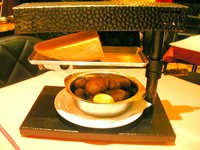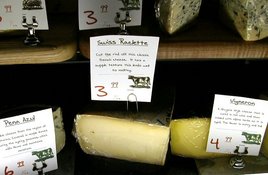Back when cows were cows and men were men, Alpine farms spent snowbound winters in virtual isolation. No grazing on shared mountain pastures, no massive cheeses like Gruyere and Emmenthal made in cooperative dairies where the milk was "cooked" in enormous communal kettles. But cows give milk year-round (though not as much when they're stabled and fed silage) so the resourceful farmers of yesteryear developed secondary products: smaller, intensely flavorful "winter" cheeses like Morbier, Reblochon and Raclette.
Raclette, especially, is the cheese that came in from the cold; it makes a perfect winter dinner. In Alpine lodges, half a wheel of raclette is exposed to a blazing fire until it starts to melt; the innkeeper scrapes off the oozing cheese onto a hot plate. In fact, the French word racler means "to scrape."
In Paris last year I found a restaurant that served raclette grilled on a contraption resembling a medieval torture device. But it worked, melting a hunk of cheese to perfection.
And you can do this at home, too: raclette grills are easily found online for about $50, and raclette cheese is available at The Cheese Cellar in Fisher Plaza; it's $3.99 for a quarter-pound.
My personal preference, no matter what they say about discarding the "inedible" rind: believe not a word. Once the cheese itself is melted, the rind will be all crisp and crunchy.
TOMORROW: Raclette feast in Belltown!
The Cheese Cellar, 100 4th Ave. N., 206-404-2743

